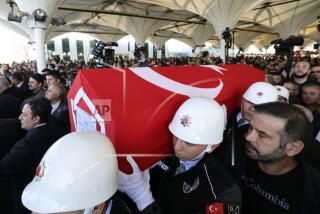Death Toll Climbs in Irbil Attacks
- Share via
IRBIL, Iraq — As grieving Kurds draped their heartland in black mourning banners and buried their dead in the muddy earth Monday, the official death toll from simultaneous suicide attacks on the headquarters of their two major political parties climbed to 67.
The attacks Sunday, the bloodiest in Iraq in five months, were an intensely personal blow to the people of these northern hills. With the deaths of the governor, deputy governor, ministers and a military commander, local Kurdish leadership has been gutted just as Kurds are struggling to put aside internal differences in hopes of preserving semiautonomy in postwar Iraq.
The strikes also deflated hopes that the Kurds might remain immune from the violence roiling the rest of the country.
“They are trying to shatter a dream,” 32-year-old tailor Muzafit Aziz said as he waited outside the gates of Sawaf Mosque, where thousands of men gathered Monday afternoon to pay condolences to the party leaders.
Many of the Kurdish officials blamed Al Qaeda and its alleged local surrogate, Ansar al Islam, for the bombings.
“Al Qaeda was behind the attack,” said Karim Sinjari, interior minister in western Kurdistan, which is controlled by the Kurdistan Democratic Party, or KDP. “They prepared and planned it, and Ansar al Islam facilitated it.”
Ansar members -- Muslim fighters with the common goal of decimating secular Kurdish political groups -- were driven from their mountain base during the U.S.-led invasion of Iraq last year. Some Kurdish officials said Monday that Ansar cells were probably still active in and around Irbil, 200 miles north of Baghdad.
Kurdish officials were still investigating the bombed-out offices of the KDP and the Patriotic Union of Kurdistan offices and reviewing videotapes made of Sunday’s celebrations in hopes of identifying the bombers.
U.S. military officials have warned that Al Qaeda members and other foreign fighters have infiltrated Iraq.
“It’s not as if these people have a stamp on their forehead,” Deputy Interior Minister Faiq Tawfiq said. “It’s not easy to find them.”
Saddadin Abdullah, whose father was killed at the KDP headquarters, blamed U.S. troops and the Kurdish leaders themselves, who he said were slow to respond to the growing presence of radicalized Islamic militants in the mountains.
“The influence of these men has developed for years, and with the coming of the Americans their numbers increased,” he said. “Now Iraq has become the theater of gladiators. Now Iraq has become the world’s battlefield.”
His father, 62-year-old cleric Abdullah Malawed, preached politics along with Islam at White Mosque in Irbil, instructing his followers to support a federal system in Iraq that would keep Kurdish autonomy alive. The United States was a liberator sent by God, he told them, to free the Kurds from dictatorship.
“He was a man who always hated terrorism and extremism,” said his son, who sat weeping in the dimmed mosque Monday. “He taught that Islam had an open mind.”
The struggle for stability is particularly painful among the Kurds, who rose up against Saddam Hussein in 1991. After that, the ethnic group gained a degree of self-rule, protected in part by a U.S.- and British-patrolled “no-fly” zone that kept Iraqi forces at bay. The Kurds are hoping to hold on to -- or even deepen -- their autonomy in the Iraq now taking shape.
“The thing about the Kurdish cause is, it’s not just a political movement,” said Peter Galbraith, a former U.S. diplomat visiting Kurdistan. “These people have dedicated their entire lives to the cause. Now, after the attacks, they’re going to be even more reluctant to come under the power of Baghdad.”
The KDP and Patriotic Union of Kurdistan, or PUK, two secular parties and longtime rivals, had been negotiating to merge into a unified bloc, party representatives said. Many members decried the weekend attacks as an attempt to drive the two further apart, and they vowed to draw even closer in solidarity.
“These terrorist acts are against the unity of our administrations that we have agreed on,” KDP leader Massoud Barzani wrote in a condolence letter to PUK chief Jalal Talabani, Associated Press reported. “The two of us, along with other political democratic parties, must work together to end these terrorist acts.”
Talabani replied, “We shall work more seriously toward uniting our government.”
But privately, some Kurds questioned whether the deep animosities between the groups could ever give way to trust.
“This is very temporary,” said lawyer Mustafa Ali. “The differences between them are too big for them to come together permanently.”
*
Special correspondent Yalman Ahmed in Kirkuk contributed to this report.
More to Read
Sign up for Essential California
The most important California stories and recommendations in your inbox every morning.
You may occasionally receive promotional content from the Los Angeles Times.













